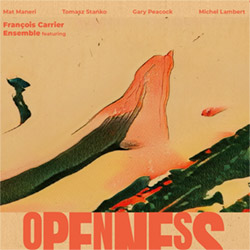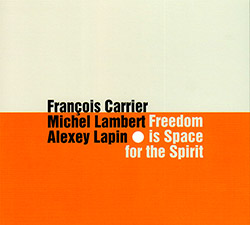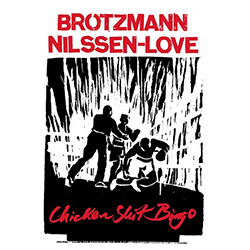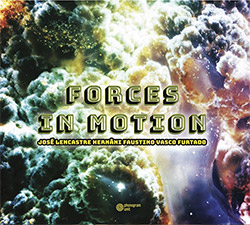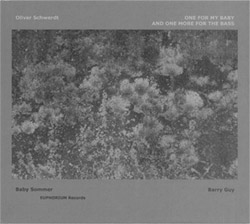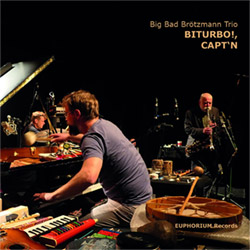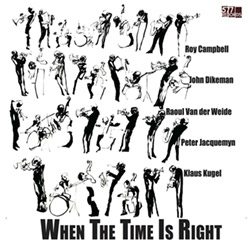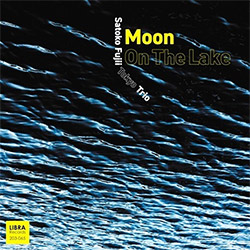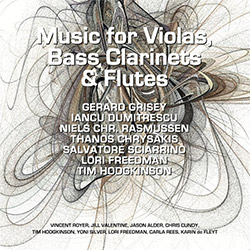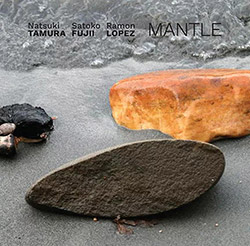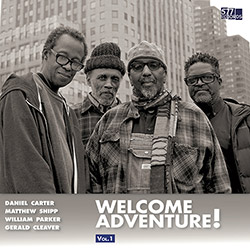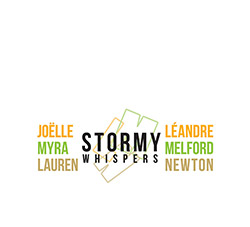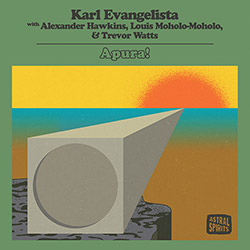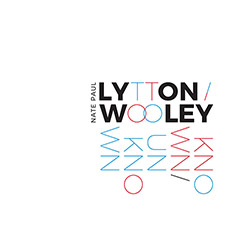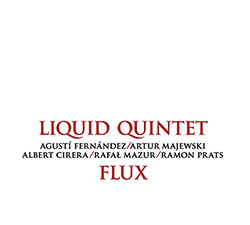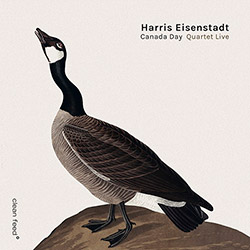![Carrier, Francois / Alexander Hawkins / John Edwards / Michel Lambert: Nirguna [2 CDs] (Listen! Foundation (Fundacja Sluchaj!)) Carrier, Francois / Alexander Hawkins / John Edwards / Michel Lambert: Nirguna [2 CDs] (Listen! Foundation (Fundacja Sluchaj!))](https://www.teuthida.com/productImages/misc4/27459.jpg)
A complete, powerful performance at London's Vortex club from the indefatigable quartet led by Canadian saxophonist Francois Carrier, featuring one of the finest European young piano virtuosos, Alexander Hawkins, one of the most in-demand bass players on the Euro/London free improv scene, John Edwards, and long running partner to Carrier, drummer Michel Lambert.
Out of Stock
Quantity in Basket: None
Log In to use our Wish List
Shipping Weight: 2.00 units
Sample The Album:
Francois Carrier-alto saxophone
John Edwards-bass
Michel Lambert-drums
Alexander Hawkins-piano
Click an artist name above to see in-stock items for that artist.
UPC: 5905279364424
Label: Listen! Foundation (Fundacja Sluchaj!)
Catalog ID: FSR 04 | 2019
Squidco Product Code: 27459
Format: 2CDS
Condition: New
Released: 2019
Country: Poland
Packaging: Cardboard Gatefold
Recorded live at the Vortex Jazz Club in London, UK, on June 7th, 2017, by Francois Carrier.
"François Carrier and Michel Lambert - Canadian musicians-travelers - do not stop in their activities! Every spring they return to Europe to play a full-blown free jazz concert in beautiful natural circumstances. In each destination, the saxophonist and drummer seem to have their regular partners. In Poland it is Rafał Mazur, in the United Kingdom generally John Edwards.
Two springs ago (exactly June 7 2017), Aleksander Hawkins joined the group of British partners. The quartet created in this way played a truly fiery concert in London's Vortex Club, and we - through the Listen Foundation - today we can listen to the entire spectacle, located on two discs, in bold and comfortable conditions. Two sets, four fragments with titles, a total of nearly 102 minutes! François Carrier on alto saxophone, Alexander Hawkins on piano, John Edwards on double bass and Michel Lambert on drums. The disc is called Nirguna.
Saguna. The set of the first concert opens with a quiet timbre of the alcist. After a few breaths, the game comes with an extensive section that sounds like hard & heavy bop masters. The narrative is sewn from the beginning with a dense stitch and raises the singing alt to the high hill. The quartet's travel route seems to concern first of all Hawkins, who is the undoubted nerve of the whole story, the main creator of changes, the main stimulator of sparkling beauty, how free improvisations, built on the basis of fast, fully open jazz. Particularly well, the presence of the pianist affects the way Carrier creates improvisation, which, despite high and repeatedly documented competences in this area, tends to suspend narration or stop at moments that are not completely dramatically justified. Here, in the presence of Hawkins, he not only avoids this type of behavior, but if he decides to do so, the keyboard partner pulls the flow, and the whole story continues in an equally expressive style. Here, during the first part of the quartet, the full ability to generate free jazz surf is achieved after 120 seconds. After another few minutes, the musicians decide on the first stopping of the day, which becomes an opportunity for the final exposure of the evening, a beautiful pianist exhibition, which seems to feel in these concert circumstances, like a fish in water. The quartet machine slows it down as it should, it speeds up without undue delay, funding us - again and again - the brilliant individual performances of each of the musicians, always made with the support of two or even three partners. Even a beautiful double bass solo on the background of repetitive foam and circular drumming. The narrative is characterized by a large variability of pace, distribution of accents, creating a situational leader, mutual stimulation of all musicians. In the 18th minute, we note the agile descent to the level of silence, made on the shoulders of the double bass player. After 20 minutes - a handful of jazz nostalgia, reflection, as well as classical accents on the keyboard. So what ever you want ! At the end of the first part, also a few sips of fire water dedicated to Coltrane or Ayler. The reverb is colored by Hawkins solo, intriguingly supported by strong accents of double bass and drums.
Jivatma. The second part of the first set, a kind of encore lasting several minutes: a rhythmic, very collective intro, in good communication, without unnecessary sounds - feisty actions, accurate retorts, some mutual imitations, dialogues and even faces in subgroups. Acid flow of double bass, another great pianist exhibitions. In 7-8 minutes frivolous duo piano-alt, then very quickly developed into a free jazz gallop.
Paramatma. After a break, the musicians offer us a sequel, again collectively programmed, performed very freely, with the charming grace of free jazz. Canadians may be playing one of their best concerts, after all, with those British, you can safely steal horses! After a few moments of re-recognition, the musicians interact more strongly and react well to each other again. Between6 a They offer us a free power trio with 8 minutes (Hawkins is silent), and after a while, on the back of the strand suspended on the double bass, go to the phase of sonoristic tendencies. The musicians seem to focus less on expressive power eruptions in this passage, while they are more narrative in the formula of open jazz and only good reactions to the actions of their partners - a truly enlightened collectivism! Stylistically and dramatically the most here is still a smart pianist, with every second of stories having a good idea for continuation. The terminator oversees the appropriate level of overall dynamicsEdwards. In the 27th minute, the creativity of the quartet leads us towards a sweet ballad with a large dose of sense of humor. The musicians feel great on stage, they know that they can afford a lot. For the finale of this part of the second set - it is not known which evening, a beautiful passage straight from the heated piano keyboard, and in the background a bright and vigilant bass'n'drums section. The last piece of the puzzle completes improvisation with a short but precise solo (applause Lambert!).
Nirguna. The final episode of the concert, by the way the title song, greets us with a pinch of percussion swing, supported by a double bass string and a classical piano with a singing alto. The musicians exit this introduction straight into a free jazz gallop with a saxophone on a slight delay. After 10 minutes, they sensually suppress emotions, this time based on a high pizzicato, they serve us another pearl on the piano and are agile looking for end credits. The last straight is full of Ayleric elation, both tender to the touch and spicy in taste."-Trybuna Muzyki Spontanicznej (translated by Google)
Get additional information at Trybuna Muzyki Spontanicznej
Artist Biographies
• Show Bio for Francois Carrier "b. 5 June 1961, Chicoutimi, Quebec, Canada. Carrier began his career as a professional jazz musician, playing alto saxophone in Vancouver in 1979. He soon attracted attention from fellow musicians and a growing audience through his often audacious approach to his music. Based since 1982 in Montreal, he has shown himself to be a fluid and inventive performer of improvised music, especially since the formation in 1990 of his trio, in which he was joined by bass player Pierre Coté and drummer Michel Lambert. Following the release of Intuition, which was nominated as Jazz Album Of The Year at the 1998 Gala de l'ADISQ (Québec's Music Awards show), Carrier's trio toured Europe, playing at the Montreux Jazz Festival. Also in 1998, Carrier founded Nouvel Ensemble De Musique Improvisée (NoEMI), a gathering of like-minded free players, among whom have been Dewey Redman and Sonny Greenwich. Early in 2002, Carrier spent some months composing new works in Rome, having won an award by the Conseil des Arts et des Lettres du Québec. More tours of Canada and some European countries followed, as did more acclaimed albums. Over the years, in concert and sometimes on record, Carrier's trio has been augmented by guest pianists who have included Steve Amirault, who appeared on Carrier's Juno Award-winning Compassion (2000), Paul Bley and Gary Peacock, heard on Traveling Lights (2004), Uri Caine, on All'Alba (2003), Jason Moran and Bobo Stenson. Among other musicians with whom he has worked are Mat Maneri, Uwe Neumann and Gary Peacock. Carrier's sound is tough and he attacks his music with verve and unpredictability, demanding, and successfully receiving from audiences, attention to and understanding of the swiftly changing moods he explores." "Francois Carrier knows how to surround himself, find the most compatible partners, and maintain a recorded presence all over the world. His rich, deep playing that blends lyricism with boldness and a sense of surpassing one's self has earned him a place in the Eight Annual International Critic's Poll of El Intruso 2015 and in the DownBeat's 2013 Best Alto Sax Players List. In 2001 he won a Juno Award in the Best Contemporary Jazz Album category for his third album Compassion (Naxos Jazz). To date, François combines an impressive discography of over thirty internationally acclaimed albums with legendary musicians such as Paul Bley, Gary Peacock, Bobo Stenson, Tomasz Stanko, Uri Caine, Jason Moran, Dewey Redman, Mat Maneri, Sonny Greenwich, Jean-Jacques Avenel, John Edwards, Steve Beresford, Rafal Mazur, etc. Drummer Michel Lambert has been his most faithful collaborator. Together, Michel and François undertook several tours in Europe, Asia and Canada. In 2002, François spent six months in Québec Studio in Rome as a saxophonist-composer where created links with the Italian music scene. He also lived in the Québec Studio in London in 2011, where he worked among other things in the development of his Free Opera and initiates a number of recording sessions with several London musicians. In 2005 he was spotted by British label Leo Records with whom he released five unique albums. Several European avant-garde music labels then join the party such as Creative Sources (Portugal), Ayler Records (Sweden-France), FMR Records (England), Not Two Records (Poland). Following the major international media coverage, the demands keep multiplying. Thus soon, François will publish four new albums recently recorded during his 2015 European tour on NoBusiness Records (Lithuania) For Tune Records (Poland) and FMR Records." ^ Hide Bio for Francois Carrier • Show Bio for John Edwards "After taking up the bass, around 1987, John Edwards co-formed The Pointy Birds who went on to win awards for their music for The Cholmondeleys and Featherstonehaughs dance troupes. The group appeared at festivals in Glasgow, Edinburgh, Moers, Leverkusen, Copenhagen. Around 1990, Edwards played his first gigs with London improvisers such as Roger Turner, Lol Coxhill, Maggie Nicols, Phil Minton. Between 1990 and 1995 Edwards was a member of three touring groups simultaneously: B-Shops For The Poor, The Honkies and GOD. During this period he also became an increasingly regular player on the London improvised music scene and performed his first solo gigs; he composed and performed music theatre with the bass and cello duo The Great Explorers, street-busked a lot and appeared at many more festivals in Germany, Estonia, France, Italy, Czech, etc. Since 1995 John Edwards has become a "mainstay" of the London scene, playing with just about everybody, an activity that has seen him clocking up between 150 and 200 gigs a year. He has become regular player with Evan Parker, in many groupings, and with Tony Bevan, Veryan Weston, and Elton Dean, often in collaboration with Mark Sanders on percussion. He has become a more frequent player on the European (and festival) scene, appearing at Taktlos, Ulrichsburg, Nickelsdorf, Budapest, New Zealand and in the USA. He continues to work on solo performances." ^ Hide Bio for John Edwards • Show Bio for Michel Lambert "Michel Lambert is the descendant of a virtual dynasty of classical musicians in Quebec. First exposed to music by his mother and then his grandfather Omer Létourneau, he spent a good part of his youth between the Petit Séminaire and the Conservatoire de Musique de Québec, the city where he was born in 1959. His fascination with drums and composition inspired him to pursue his musical education at Berklee College in Boston, where his professors included John La Porta, Herb Pomeroy, and Greg Hopkins. Later on, he travelled to Paris, attended the Banff Jazz Workshops, studied with Dave Liebman in New York and Misha Mengelberg in Amsterdam. Following a few meetings with Charlie Haden, he joined Milcho Leviev's trio in Los Angeles in 1983. Since then, different projects have taken him to Europe, across Canada, the U.S. and Asia, at different festivals like the Berliner Jazztreff, Jazzfest Wien, l'Europa Jazz Festival du Mans, Pori Jazz, Internationales New Jazz Moers, Tampere Jazz Happening, Jakarta Jazz Festival, Birmingham Jazz Festival, le Festival International de Jazz de Montréal and many others. He has performed and recorded with Gary Burton, Dewey Redman, Barre Phillips, Kenny Wheeler, Bobo Stenson and Uri Caine among others. In Toronto from '87 to '94 and living in Montreal since '96, he has performed coast to coast with the groups of Sonny Greenwich, Herbie Spanier, Wray Downes, Don Thompson or Dave Young. A recording artist in Europe with Lonely Universe for CMP Records, Germany / Jimco Japan, the cd project won international acclaim ... "adventurous yet contained, always uncompromisingly searching" quoted the New York Review of Records. With Finnish guitar player Raoul Björkheim, a review of "Ritual" in Wire Magazine mentioned " ...a vital and important record..." . He performs internationally with his wife, vocalist Jeannette Lambert, whose recent cd "Lone Jack Pine" is described in Cadence as "... art at a very high level". He has Canadian recording credits which include, for Justin Time, with Dave Young, "Inner Urge" and 1993 JUNO Award-winning "Fables and Dreams", the Herbie Spanier Anthology volume I and II and "Resonance" with Reg Schwager and François Carrier Trio with Uri Caine. On the Rant Label, he has produced several sessions with his ground breaking trio Maïkotron Unit, "5ieme cycle de 7", "Composition with Three Figures" and Lonely Universe "à la Plage". Other recordings include "Les Trois Michel" with Michel Donato and Milcho Leviev for DSM , AD2000 with Agostino Di Giorgio a session recorded in Budapest, the year 2000 Canadian JUNO Award-winning session, "Compassion", Krakatau "Alive", in Helsinki, and Frédéric Alarie Trio "Live à Vienne" for Fidelio Audio. Michel Lambert also appears on numerous cd compilations. In 2001 he started a series of compositions titled "Musiques Dessinées", entirely based on drawings. In 1998, with a grant from the Conseil des Arts et des Lettres du Québec, he was resident of the Studio du Québec in New York City. In 1988, he composed his "Journal des Episodes, 366 Episodes pour orchestre symphonique" . In '92, 33 excerpts from the work received a World Premiere performance at the first Winnipeg New Music Festival by the Winnipeg Symphony Orchestra. His orchestral works also include "Le Passant, Triptyque pour Orchestre Symphonique" ('92). As a composer and band leader, over 50 of his jazz related compositions have been broadcast nationally. When he brought his quartet to the Ontario Science Centre for CJRT Sound of Toronto Jazz Series, critics wrote "...a challenging hour of unusual fare created by a masterly drummer" et "Lambert pushes the Jazz series to the edge"." ^ Hide Bio for Michel Lambert • Show Bio for Alexander Hawkins "Alexander Hawkins is a composer, pianist, organist, and bandleader who is 'unlike anything else in modern creative music' (Ni Kantu) and whose recent work has reached a 'dazzling new apex' (Downbeat). A largely self-taught improviser, he works in a vast array of creative contexts. His own highly distinctive soundworld is forged through the search to reconcile both his love of free improvisation and profound fascination with composition and structure. In 2012, he was chosen as a member of the first edition of the London Symphony Orchestra's 'Soundhub' scheme for young composers. He also received a major BBC commission in late 2012 for a fifty minute composition: One Tree Found was first performed and broadcast in March 2013, and was subsequently performed and broadcast for the WDR in Cologne (2014). He has also twice been commissioned by the London Jazz Festival (once as composer, once as an arranger), and by the Cheltenham Jazz Festival (2016). An in-demand sideman, Hawkins continues to be heard live and on record with vast array of contemporary leaders of all generations, including the likes of Evan Parker, John Surman, Joe McPhee, Mulatu Astatke, Wadada Leo Smith, Anthony Braxton, Marshall Allen, Rob Mazurek, Taylor Ho Bynum, and Harris Eisenstadt, amongst many others. He has also been noted in recent years for his performances in the bands of legendary South African drummer, Louis Moholo-Moholo. Concert appearances have taken him to club, concert and festival stages worldwide." ^ Hide Bio for Alexander Hawkins
4/24/2024
Have a better biography or biography source? Please Contact Us so that we can update this biography.
4/24/2024
Have a better biography or biography source? Please Contact Us so that we can update this biography.
4/24/2024
Have a better biography or biography source? Please Contact Us so that we can update this biography.
4/24/2024
Have a better biography or biography source? Please Contact Us so that we can update this biography.
Track Listing:
CD1
1. Saguna 37:43
2. Jivatma 13:16
CD2
1. Paramatma 35:03
2. Nirguna 15:53
Improvised Music
Jazz
Free Improvisation
Canadian Composition & Improvisation
London & UK Improv & Related Scenes
Quartet Recordings
Staff Picks & Recommended Items
Search for other titles on the label:
Listen! Foundation (Fundacja Sluchaj!).


![Carrier, Francois / Alexander Hawkins / John Edwards / Michel Lambert: Nirguna [2 CDs] (Listen! Foundation (Fundacja Sluchaj!)) Carrier, Francois / Alexander Hawkins / John Edwards / Michel Lambert: Nirguna [2 CDs] (Listen! Foundation (Fundacja Sluchaj!))](https://www.teuthida.com/productImages/full/27459.Full.jpg)
